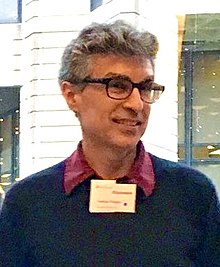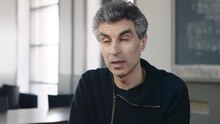Yoshua Bengio
Yoshua Bengio | |
|---|---|
 Yoshua Bengio, October 27, 2016 | |
| Born | 1964 (age 54–55) |
| Residence | Montreal, Quebec |
| Citizenship | Canada |
| Alma mater | McGill University |
| Known for | Deep Learning, Neural machine translation, Generative Adversarial Networks, Word embeddings, Denoising Auto-Encoders, neural language models, Curriculum Learning, Learning to learn |
| Scientific career | |
| Fields | Computer science |
| Institutions | Université de Montréal |
| Thesis | Artificial Neural Networks and their Application to Sequence Recognition (1991) |
| Doctoral advisor | Renato de Mori |
| Notable students | Ian Goodfellow, Hugo Larochelle, Pascal Vincent, Nicolas Chapados, Kyunghyun Cho, Antoine Bordes, Aaron Courville, Narjes Boufaden |
| Website | iro.umontreal.ca/~bengioy |
Yoshua Bengio OC (born 1964 in France) is a Canadian computer scientist, most noted for his work on artificial neural networks and deep learning.[1][2][3]
Bengio received his Bachelor of Engineering (electrical engineering), Master of Science (computer science) and PhD (computer science) from McGill University.[4] He was a post-doctoral fellow at MIT (under Michael I. Jordan) and AT&T Bell Labs.[5] Bengio has been a faculty member at the Université de Montréal since 1993, heads the MILA (Montreal Institute for Learning Algorithms) and is co-director of the Learning in Machines & Brains project of the Canadian Institute for Advanced Research.[4][5]
Along with Geoffrey Hinton and Yann LeCun, Bengio is considered by Cade Metz one of the three people most responsible for the advancement of deep learning during the 1990s and 2000s.[6] Whereas the other two went to work for Google and Facebook respectively, Bengio has stayed in academia. Among the computer scientists with an h-index of at least 100, Bengio is the one with the most recent citations per day, according to MILA.[7][8]
In October 2016, Bengio co-founded Element AI, a Montreal-based artificial intelligence company that turns AI research into real-world business applications.[6] In May 2017, Bengio announced that he was joining Montreal-based legal tech startup Botler AI, as a strategy adviser.[9]
Contents
Awards[edit]
In 2017, Bengio was named an Officer of the Order of Canada.[10] The same year, he was nominated Fellow of the Royal Society of Canada[11] and received the Marie-Victorin Quebec Prize.[12]
Literature[edit]
- Ian Goodfellow, Yoshua Bengio und Aaron Courville: Deep Learning (Adaptive Computation and Machine Learning), MIT Press, Cambridge (USA), 2016. ISBN 978-0262035613.
- Dzmitry Bahdanau; Kyunghyun Cho; Yoshua Bengio, "Neural Machine Translation by Jointly Learning to Align and Translate", arXiv (in German)
- Léon Bottou, Patrick Haffner, Paul G. Howard, Patrice Simard, Yoshua Bengio, Yann LeCun: High Quality Document Image Compression with DjVu, In: Journal of Electronic Imaging, Band 7, 1998, S. 410–425 doi:10.1117/1.482609
- Bengio, Yoshua; Schuurmans, Dale; Lafferty, John; Williams, Chris K. I. and Culotta, Aron (eds.), Advances in Neural Information Processing Systems 22 (NIPS'22), December 7th–10th, 2009, Vancouver, BC, Neural Information Processing Systems (NIPS) Foundation, 2009
- Y. Bengio, Dong-Hyun Lee, Jorg Bornschein, Thomas Mesnard, Zhouhan Lin: Towards Biologically Plausible Deep Learning, arXiv.org, 2016
References[edit]
- ^ Knight, Will (July 9, 2015). "IBM Pushes Deep Learning with a Watson Upgrade". MIT Technology Review. Retrieved July 31, 2016.
- ^ LeCun, Yann; Bengio, Yoshua; Hinton, Geoffrey (2015). "Deep learning". Nature. 521 (7553): 436–444. doi:10.1038/nature14539. PMID 26017442.
- ^ Bergen, Mark; Wagner, Kurt (July 15, 2015). "Welcome to the AI Conspiracy: The 'Canadian Mafia' Behind Tech's Latest Craze". Recode. Retrieved July 31, 2016.
- ^ a b "Yoshua Bengio". Profiles. Canadian Institute For Advanced Research. Retrieved July 31, 2016.
- ^ a b Bengio, Yoshua. "CV". Département d'informatique et de recherche opérationnelle. Université de Montréal. Retrieved July 31, 2016.
- ^ a b Metz, Cade (2016-10-26). "AI Pioneer Yoshua Bengio Is Launching Element.AI, a Deep-Learning Incubator". WIRED. Retrieved 2018-09-07.
- ^ "Yoshua Bengio, the computer scientist with the most recent citations per day". MILA. September 1, 2018. Retrieved October 1, 2018.
- ^ "Computer science researchers with the highest rate of recent citations (Google Scholar) among those with the largest h-index". University of Montreal. September 6, 2018. Retrieved October 1, 2018.
- ^ "A Trump Dividend for Canada? Maybe in Its A.I. Industry". Retrieved 2018-10-11.
- ^ "Order of Canada honorees desire a better country". The Globe and Mail. June 30, 2017.
- ^ "Royal Society of Canada". December 16, 2017.
- ^ "Prix du Quebec". December 16, 2017.
External links[edit]
| Wikimedia Commons has media related to Yoshua Bengio. |
| This biographical article relating to a Canadian computer specialist is a stub. You can help Wikipedia by expanding it. |
| P ≟ NP | This biographical article relating to a computer scientist is a stub. You can help Wikipedia by expanding it. |
